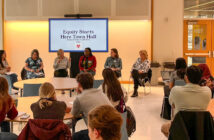![]() Sitting on the top shelf in the living room of my childhood home has always been a water- damaged, falling-apart copy of “How to Win Friends & Influence People” by Dale Carnegie.
Sitting on the top shelf in the living room of my childhood home has always been a water- damaged, falling-apart copy of “How to Win Friends & Influence People” by Dale Carnegie.
For years, my dad pestered me to read it, citing it as the most influential book he had ever read. Maybe I had always been too proud or turned away from the title, which seemed too good to be true. I would always roll my eyes and say “maybe another time” each occasion he would bring it up.
I had also never been the type of person to believe that self-help books actually worked.
Yet, approaching my junior year of college and craving a fresh start, I finally decided to go against my own objections and give in.
With the book having originally been published in 1936, I couldn’t have expected that the principles discussed in it would actually relate to my own life experiences. Yet this summer, at one of the most dynamic and uncertain times of my life, I learned some of the greatest lessons.
Obviously, my dad could now say, “I told you so.”
The book contains four sections of guiding principles: how to handle others, make people like you, win people to your way of thinking and be a better leader. Even with many outdated examples of salesmen, the book held my interest.
Principles like smiling at people, being a good listener or showing genuine interest in others seem fairly straightforward. Like with most self-help books, I think the difficulty lies in applying its lessons.
Reading “How to Win Friends & Influence People” came at an incredibly timely moment for me. This summer, I was working both a part-time job and an internship—far removed from my life and identity at Lehigh.
Even as an upcoming junior in college, with half of my freshman year and all of sophomore year significantly altered by the pandemic, I was still looking for new experiences and a new reason to call Lehigh home.
One of my favorite principles from the book is “Give honest, sincere appreciation.” Humans have an innate desire to feel important and appreciated. I have always subconsciously admired and appreciated small acts by others, but I often never communicated them.
Yet I’ve learned, even during the first few weeks of being back at Lehigh, that the smallest actions, like complimenting someone’s outfit or thanking friends for acts of kindness, can go a long way.
My other favorite principle is “Remember that a person’s name is, to that person, the sweetest and most important sound in any language.” Calling someone by their name seems like such a simple task, yet reading Carnegie’s work made me reflect.
I began my junior year at Lehigh by taking a step out of my comfort zone and becoming an orientation leader. Surrounded by a bunch of new people, I challenged myself to learn and remember everyone’s name in those first few days.
Now, whenever I meet anyone, I challenge myself to remember their name, and the next time I see them, I make sure I use it.
After reading “How to Win Friends & Influence People,” I now recognize even more aspects of myself that I want to work on. I want to become a better leader, I want to become a better listener and I want to see things better from other points of view.
Carnegie’s principles don’t magically give me the answers to instantly win people over on day one. Instead they serve as a foundation upon which I want to build. Carnegie tells the reader that each principle takes time and should be put into practice often. Progress isn’t linear. It’s a winding path with obstacles and successes along the way.
Many things are completely different than they were in 1936. Yet, through Carnegie’s words, I learned that language, human nature and the simple things are timeless.





Comment policy
Comments posted to The Brown and White website are reviewed by a moderator before being approved. Incendiary speech or harassing language, including comments targeted at individuals, may be deemed unacceptable and not published. Spam and other soliciting will also be declined.
The Brown and White also reserves the right to not publish entirely anonymous comments.